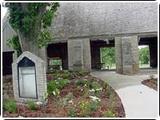Saving an Architectural Landmark
Making it Flood Resistant
Austin, MN - The former St. Paul's Evangelical Lutheran church will still be a gathering place. Despite decades of repetitive flooding damaging its interior and a subsequent buyout by FEMA and the city of Austin, the structure will again host celebrations. On a Sunday in July 2001, an audience that included over a 100 veterans stood by when the former church was dedicated as the Veterans Pavilion in the new Community Park along the river.
To stop the cycle of flooding, cleanup, and costly repairs in a neighborhood bordering the Cedar River, an acquisition program was begun after severe flooding in 1978. The project was supported by the citizens group FACTS, the City of Austin, the Minnesorta Division of Emergency Management (MDEM) and FEMA. More structures were designated for buyouts after flooding in 1993.
In the acquisition program, structures sturdy enough to be moved can be relocated out of the flood plain, while others are torn down and removed. The goal is to prevent future flooding damage and protect lives by removing structures from the 100-year flood plain. Based on the many floods of record in past decades, this goal has clearly been met.
The fate of St. Paul's Lutheran Church seemed to be that of demolition. Completed in 1953, the church building suffered costly flood damage in 1965 and 1978. With a $100,000 loan from the U.S. Small Business Administration, the congregation was able to rebuild the church, occupying the building once again in 1980. More damages suffered in the 1993 flood prompted the church leadership to participate in the buyout program. The congregation relocated to temporary facilities and eventually built a new church in another part of Austin -- away from the floodwaters. The original church structure was slated to be torn down.
City leaders and residents considered the church an architectural landmark alongside the river and were disheartened by the idea of demolishing it. A park was planned for the space vacated by the other structures in the buyout program. And parks need sheltered picnic areas. The idea began to take shape that the church could remain in place as an open, public shelter.
"It was a landmark for the city," said Dennis Maschka, parks and recreation director for the City of Austin. "It was too nice of a structure to tear down and it was a nice centerpiece for the whole area."
Mayor Bonnie Besse Rietz and the Housing and Redevelopment Authority (HRA) pursued approval from FEMA to retain the structure in its current location. Because the city used FEMA Hazard Mitigation Grant Program funds to acquire the property, any structure remaining in a floodplain acquisition area had to meet strict criteria. Requirements state the structure could remain as a public facility that is "open on all sides and functionally related to a designated open space or recreational use" and upon completion of the project, "no application for additional disaster assistance will be made for any purpose with respect to the property to any Federal entity or source..." The city hired a design firm to assist in developing a renovation plan that would conform to the requirements, which was approved by FEMA in early 2000.
Mower County,
Minnesota



Quick Facts
Sector:
Private
Cost:
$200,000.00 (Estimated)
Primary Activity/Project:
Acquisition/Buyouts
Primary Funding:
Hazard Mitigation Grant Program (HMGP)

